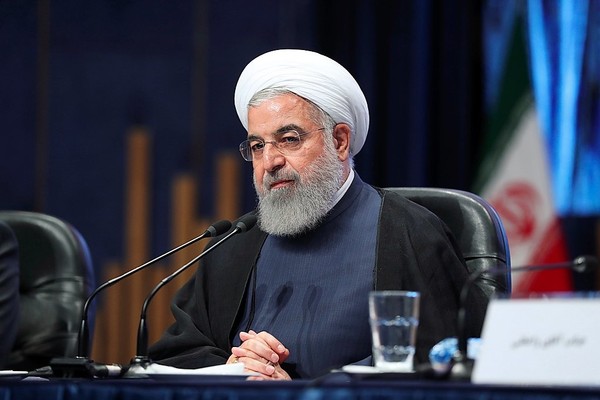Apply critical thinking to Iran nuclear deal to avoid another Iraq (Commentary)

By Paul Welch
Germany, France, United Kingdom, China, Russia and the European Union agree with the International Atomic Energy Agency's findings that Iran is currently abiding by the Iran nuclear agreement's requirements.
In his U.S. visit, French President Macron has proposed negotiations on a "new deal" aimed at curbing Iran's military power and regional activities, to exist alongside the three-year-old Joint Comprehensive Plan of Action (JCPOA). This new deal would go further, imposing a permanent check on those nuclear activities, while also limiting the country's development of ballistic activities, and its military operations across the region, particularly in Syria. German Chancellor Angela Merkel reinforced Macron's position with President Trump.
France and Germany publicly opposed the Iraq invasion. Regretfully, our Congress, with a majority in both parties in the Senate, enacted the Iraq War Resolution. The primary rationale was the supposed existence of weapons of mass destruction, including nuclear weapons. Despite the pleas of Hans Blix, the United Nations chief weapons inspector, that his team only needed six more months to certify whether Iraq had nuclear weapons or not, President George W. Bush "let loose the dogs of war." Four thousand, four hundred and eighty-six American military were killed. Somewhere between 165,000 and 500,000 Iraqis died. Huge numbers of wounded and disabled people on both sides had their lives altered forever. ISIS arose from the smoldering ashes of war- ravaged Iraq.
Blix said "critical thinking" was missing in the US decision for war in Iraq. We know about the 1979 Iranian Revolution, the toxicity of Iran's Islamic Revolutionary Guard, their support of Hezbollah, Hamas and Syria's Bashar Assad, and their ballistic missiles. To spur critical thinking, I cite the following:
* Our 1953 coup against Iran's popular, democratically elected Prime Minister Mohammad Mosaddegh, and its aftermath, is the principal reason Iran calls us the Great Satan.
* The toppling of the Saddam Hussein regime turned Iraq from a foe to an ally of Iran.
* Iran holds Israel and the United States responsible for the millions of Palestinians in refugee camps and under Israeli occupation.
* Prior to the 2017 protests, Iranians held four major protests (followed by harsh repressions), which eventually led to a more moderate parliament. The nuclear agreement is a positive for President Hasan Rouhani, a moderate, who last year won re-election with 57 percent of the vote. The radical Islamic Revolutionary Guard wants the agreement scrapped.
* Sunni Saudi Arabia and Shi'a Iran are engaged in a Middle East power struggle. Iran has an elected Parliament with final power held by Supreme Leader Ayatollah Ali Khamenei, head of state and commander-in-chief of the military and Islamic Revolutionary Guard. On the other hand, the House of Saud rules Saudi Arabia absolutely, with long standing Wahhabi clerical input. Saudi Arabia has a horrible human rights record, is the home country for 15 of the 9/11 bombers, exports its radical version of Islam throughout the world and is arguably the largest supporter of terrorism in the world. Remarkably, Crown Prince Mohammed bin Salman has targeted Qatar for an embargo because of their support of terrorism. He also states Saudi Arabia will pursue nuclear weapons if Iran does so with the cancellation of the Iran Nuclear Agreement.
Currently, Salman's war in Yemen is now the world's worst humanitarian crisis, with more than 22 million people -- three-quarters of the population -- in desperate need of aid and protection, according to United Nations Secretary General Antonio Guterres said. Guterres calls Yemen "the stupid war" which is in nobody's best interest.
* Israeli Prime Minister Benjamin Netanyahu calls the nuclear agreement a "historic mistake." Let's remember Netanyahu helped push us into the disastrous Iraq War. Netanyahu is also at odds with his security team over the agreement. Additionally, Israel is a nuclear power.
* Like Netanyahu, President's Trump's judgment differs from his military advisers. Secretary of Defense James Mattis told senators that it was in America's interest to stick with the agreement. Both Marine Gen. James Dunford, and Air Force Gen. Paul Selva, the chairman and vice chairman respectively of the Joint Chiefs of Staff, reported to Congress that Iran is adhering to its Agreement's obligations.
* North Korea will certainly recalculate the viability of a U.S. commitment if the agreement is canceled.
The Afghanistan War, the Wars in Syria and Iraq, the Yemen War, Russian military moves in Eastern Europe/Syria and their electoral meddling, China's claims in the South China Sea, the African jihadist terrorist conflicts, climate enhanced natural calamities, mass killings in our country and trillion dollar deficits are some of the daunting challenges we face. Adding a nuclear-armed Iran to this list is not a reasonable option.